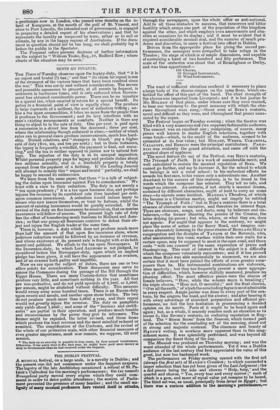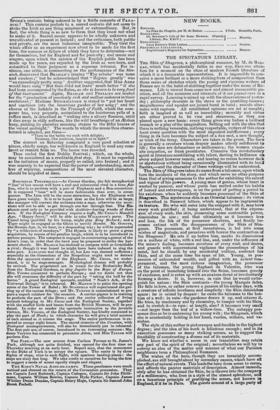THE DUBLIN FESTIVAL.
A MUSICAL festival, on a large scale, is a novelty in Dublin ; and the present one did not commence under the happiest auspices. The bigotry of the late Archbishop occasioned a refusal of St. Pa- trick's Cathedral for the morning's performances; the (so named) Evangelical party moved every engine which they could com- viand in order to dete,r public attendance ; the seision of Parlia- ment prevented the presence of many families • and the small ma- bignity.of many musical professors here vented itself in attacks, through the newspapers, upon the whole affair as anti-national. Add to all these obstacles to success, that rancorous and bitter hostility which arrays one part of the population of this kingdom against the other, and which employs even amusements and cha- rities as occasions for its display ; and it must be evident that it required considerable musical zeal, and the exercise of much pm- dence and discretion, to carry a festival into effect in Dublin. Driven from the appropriate place for giving the sacred per- formances, the managers were compelled to take refuge in the Theatre ; the stage of which is of ample dimensions, and capable of containing a band of two hundred and fifty performers. The scale of the orchestra was about that of Birmingham or Derby, and was thus apportioned- 160 Chorus,
53 Stringed Instruments,
33 Wind Instruments.
246
The want of sufficient elevation rendered it necessary to place a large body of the chorus-singers on the same floor, which en- feebled the effect of this part of the band. The chief strength of the chorus was imported from Liverpool ; and it is but justice to Mr. HOLDEN of that place, under whose care they were trained, to bear our testimony to the great accuracy with which the cho- ruses throughout were sung,—those even of RIES'S oratorio, novel and difficult as they were, and (throughout that piece) unas- sisted by the organ.
The Festival began on Tuesday evening ; when the theatre was filled with a very numerous and (we suppose) fashionable audience. The concert was an excellent one ; comprising, of course, many pieces well known in similar English selections, together with some trash—which, to the credit of the audience, seemed to be estimated at its true value ; but MOZART, WEBER, CIMAROSA, CALLCOTT, and ROSSINI were the principal contributors. PAGA- rum was evidently the grand attraction, and came off with the greatest share of applause. The novel feature (to us) of the Festival, was REIS'S oratorio, The Triumph of Faith. It is a work of considerable merit, and well calculated to sustain the musical reputation of RIES. We cannot go further, and say to increase it, for the school to which he belongs is not a vocal school : to his orchestral effects he awards his first care, to his voices only a subordinate one. Another drawback to the success of this oratorio, is to be found in the words which the composer has selected. They tell no tale, and impart no interest. An oratorio, if not strictly a musical drama, sustained by different characters, ought at least to carry on some story—to narrate some incident. HANDEL'S Theodora, of which the heroine is a Christian martyr, might not inaptly be entitled "The Triumph of Faith ;".but in RIES'S oratorio there is a total absence of character or narrative, and therefore its interest flags. There are choruses, songs, and duets, sung by believers and un- believers,—the former Chanting the praises of the Creator, the latter defying his power; but who, where, or what they are, does not appear. For aught that appears to the contrary, we might place the scene of action in the Surry Road, and imagine our- selves alternately listening to the pious strains of ROWLAND HILL'S congregation and the disciples of TAYLOR. at the Rotunda, who, after maintaining this vocal warfare within their own walls for a certain space, may be supposed to meet in the open road, and there unite "with one consent" in the same expression of praise and thanksgiving. This want of interest in the subject is a difficulty which the composer voluntarily encounters ; and if it has proved more than RIBS was able successfully to surmount, we are also certain that it must have palsied the efforts of even greater com- posers than he. His instrumental combinations are elaborate, often masterly ; but they too frequently present a mere aggrega- tion of difficulties, which, however skilfully mastered, produce no pleasing effect. The most effective pieces were the chorus of female believers, "Here, while the solemn morn is breaking ;" the triple chorus, "Hear not, 0 merciful ;" and the final chorus, "O'er all the earth," of which the concluding fugue is most admirable in every respect. Ample justice was done to every part of the ora- torio, by the singers, the band, and the chorus ; and after hearing it with every advantage of abundant preparation and efficient per- formance, we feel the less hesitation in pronouncing a decided opinion on its merits. Parts of it ought to be heard again and again; but, as a whole, it scarcely reaches such an elevation as to insure it, like SPOHR'S oratorio, an enduring reputation in Eng- land. The" Storm Scene" from the Seasons, which formed part of the selection for the concluding act of the morning, stood out in strong and majestic contrast. The clearness and beauty of HAYDN'S writing, is nowhere more apparent than in this mag- nificent scene. It was splendidly performed, and was beyond all comparison the finest thing of the day. The Messiah was produced on Thursday morning; and was the worst attended of the whole performances. Yet it was a Dublin audience of the last century that first appreciated the value of this great, but now too hackneyed work. The performance on Friday morning opened with the first act (always the first act) of HAYDN'S Creation; to which succeeded a larger selection than has yet been given of the Last Judgment ; the a ded pieces being the solo and chorus "Holy, holy," and the quartet and chorus, " Yes, every tear and every sorrow ;" each of which is a gem, and more of equal value yet remains to be heard. The third act was, as usual, principally from Israel in Egypt; but there was a curious addition to the morning's performance,'- SPoua's oratorio being ushered in by a fiddle concerto of PAGA• NINI ! This curions'prelhde to a sacred oratorio did not seem to Strike the Irish as any thing misplaced or extraordinary. But, in fact, the whole thing is so new to them that they know not what to make of it. Sacred music appears to be wholly unknown and uncultivated at present in Ireland ; and the criticisms, both public and private, are the most ludicrous" imaginable: ' They-tfeat the whole affair as an experiment now about to be made for the first time, the success or failure of which they have to determine—not for themselves, but for England and for posterity; and music and singers, upon which the opinion of the English public has been Made up for years, are regarded by the Irish as new-born, and submitted to their judgment as a supreme tribunal. For in- stance, one critic, in commenting on the performance of the Mes- siah, discovered that BRAHAM'S singing "Thy rebuke" was tame and careless ;" but he acknowledged that "Rejoice greatly" was "an exceedingly pretty song." Another suggested, that Miss Anis would have sung But thou didst not leave" much better "if she had been accompanied by the flutes, as she is known to be very fond of that instrument." Again, BRAHAM and PHILLIPS are lauded for the "production of peculiarly rich and mellow cadence* in their recitatives ;" Madame STOCKHAUSEN is stated to "put her heart and emotions into the luxurious gushes of her song ;" and the chorus of the Infidels in the Triumph of Faith, which the com- poser has, very properly, assimilated to the boisterous yells of a ruffian mob, is described as "sinking into a silvery fineness, until it dies away in stilly softness, like the wild breathings of an Aolian harp, yielding its plaintive moaning strains to the fitful breeze of the vernal midnight." The words to which the music thus charac- terized is adapted, are these— "Then to the battle we rush with delight;
Passions, like madness, inspire us in fight."
The concert on Saturday comprized a very good selection of pieces, chiefly songs, too well known in England to need any com- ment or remark from us. The house was crowded.
Thus ended the first Dublin Festival ; which, on the whole, May be considered as a creditablefirst step. It must be regarded as the initiation of music, properly so called, into Ireland ; and it was scarcely to be expected that the power of understanding, much less of enjoying., compositions of the most elevated character, should be acquired at once.



























 Previous page
Previous page